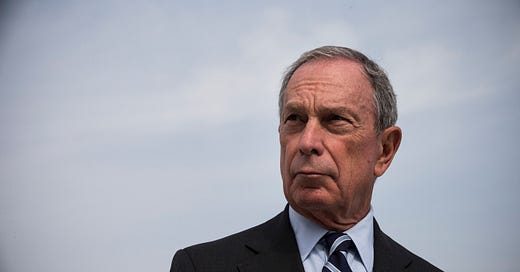The House managers in the Trump impeachment trial continued to deliver their coherent, convincing case against the president on Thursday. In addition to laying out the constitutional and legal basis for removing the president, they walked through the evidence collected in last year’s House impeachment hearings and supplemented it with more recent information. The complete and detailed timeline of the Ukraine scandal that the managers provided was the second-most-important development related to the impeachment trial so far this week.
The most important was former New York City mayor and marginal Democratic presidential candidate Michael Bloomberg’s decision to spend some of his $60 billion on television ads advocating President Trump’s removal. Since launching his presidential campaign in late November, Bloomberg has spent more than $225 million on advertising. While that vast sum hasn’t been enough to earn Bloomberg a spot in a Democratic debate, it has had an effect on the polls: Bloomberg has climbed by more than 5 percent in the RealClearPolitics average of national polls since his announcement. (As a late entrant into the race, Bloomberg is largely avoiding the early contests and focusing instead on Super Tuesday.)
Bloomberg’s ads have amplified the case for removing Donald Trump. The impeachment proceedings have dominated the news on TV, radio, and the internet, but only for those people who have chosen to tune in—and the people who are most engaged are also the most likely to have made up their minds. An earlier advertising campaign could have reached less engaged, opinionated voters.
It remains to be seen whether or not Bloomberg’s ad push has come too late to make a difference. After House Speaker Nancy Pelosi announced the formal beginning of impeachment proceedings in late September, public support for impeachment rose rapidly before plateauing. For months, support for impeachment (or impeachment and removal, depending on the poll) has generally exceeded opposition but never reached a steady majority.
But conviction on articles of impeachment requires the votes of 67 senators. If polls showed that public support for removal were above 60 percent, or even close to 60 percent, then perhaps enough Republican senators would flip. With the polls only around 50 percent, Trump’s conviction and removal seem implausible.
It’s unknowable now whether Bloomberg’s mega-millions could have made a difference had they first been deployed last fall. But if a major influx of cash doesn’t move public opinion before the end of the impeachment trial, Democrats will have plenty of reason to ask Bloomberg why he waited so long.
Presidential impeachment is, on the one hand, a vital constitutional tool, intended to be the legislature’s ultimate check on the executive. It should force our leaders in Congress to rise above party and to think clearly about the national interest.
But let’s be candid: Even as presidential impeachment raises constitutional questions of the greatest magnitude, it still takes place in the context of partisan politics. That’s just reality. The grand oratory about principles and the Framers and the fate of republican self-government is real. But so are the calculations about power, parties, and public persuasion. Accusations that impeachment is being wielded not in the national interest but for the benefit of one party are unavoidable.
In light of that unappealing reality, it is fair to ask why Democrats have not spent more money making their case on impeachment to the American people. Yes, impeachment is a prayerful act to be undertaken only with the greatest solemnity in last-ditch defense of the republic. But its success requires public support. Ads needn’t be grubby, obviously partisan productions; if they were, that would be counterproductive. They can instead explain facts and appeal to the political conscience.
So why have the Democrats half-assed it? While the Trump campaign spent close to $650,000 on anti-impeachment digital ads in just three weeks in November and planned $10 million of TV ads, Democratic groups—including the various arms of the Democratic party—lagged behind. (Bloomberg’s fellow aspirant for the Democratic nomination, Tom Steyer, has spent heavily on impeachment ads for more than a year, with little to show for it, possibly due to the quality of the ads.)
The House impeachment committees responsibly exercised their investigative powers. The witnesses who testified before the House demonstrated poise and bravery. The House managers making their case before the Senate have impressively marshaled the facts and conveyed them with forceful clarity.
But none of that matters if the senators don’t feel they have to listen.





